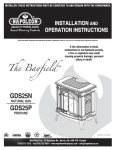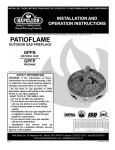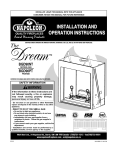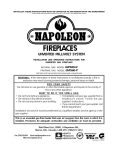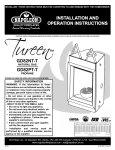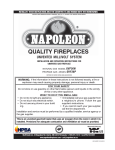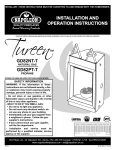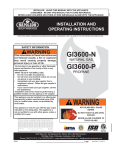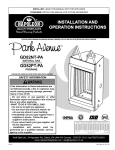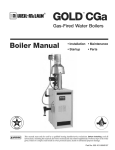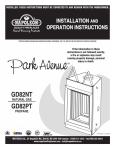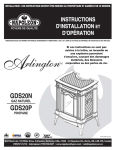Download Napoleon Fireplaces GVFS20N User's Manual
Transcript
1 W415-0559 / 02.07.06 W415-0559 / 02.15.06 2 WARNINGS & SAFETY PRECAUTIONS Do not store gasoline or other flammable vapours and liquids in the vicinity of this or any other appliance. 1. 2. 3. Installation and service must be performed by a qualified installer, service agency or the gas supplier. Follow the installation directions. 4. 5. 6. WHAT TO DO IF YOU SMELL GAS Do not try to light any appliance. Do not use any phone in your building. Immediately call your gas supplier from a neighbor's phone. Follow the gas supplier's instructions. Do not touch any electrical switch. If you cannot reach your gas supplier, call the fire department. If this fireplace is not properly installed, a house fire may result. W415-0559 / 02.15.06 3 TABLE of CONTENTS 2. 4. 5. 6. 7. 8. 9. Warnings and Safety Precautions What to do if you smell gas Warranty General Instructions General Information Mobile Home Installation Location and Clearances Pilot Indicator Light - Battery Install Blower Installation Gas Installation Finishing Screen Installation and Removal Cast Front Installation and removal Log Placement Logo Placement 10. Operation Operating Instructions For Your Safety Read Before Lighting Lighting Instructions To Turn Off Gas 11. Adjustments Venturi Adjustment Orifice Replacement Oxygen Depletion Sensor Pilot Cleaning Maintenance 12. Replacements Replacement Parts Accessories 14. Trouble Shooting 16. Service History PLEASE RETAIN THIS MANUAL FOR FUTURE REFERENCE WARNING • Under no circumstances should this heater be modified. • Provide adequate ventilation and combustion air. Provide adequate accessibility clearance for servicing and operating the heater. Never obstruct the front opening of the heater. • If heater shuts off, do not re-light until you provide fresh air. If heater keeps shutting off, have it serviced. Keep burner and control compartment clean. • Do not burn wood or other materials in this heater. • Adults and especially children should be alerted to the hazards of high surface temperatures and should stay away to avoid burns or clothing ignition. Keep young children and animals away when the stove is hot. • Due to high temperatures, the heater should be located out of traffic and away from furniture and draperies. • Clothing or other flammable material should not be placed on or near the heater. • Any safety screen or guard removed for servicing must be replaced prior to operating the heater. • It is imperative that the control compartments, burners and circulating air passageways in the heater are kept clean. The heater should be inspected before use and at least annually by a qualified service person. More frequent cleaning may be required due to excessive lint from carpeting, bedding material, etc. The heater area must be kept clear and free from combustible materials, gasoline and other flammable vapours and liquids. • Furniture or other objects must be kept a minimum of 4 feet away from the front of the fireplace. • Do not use this heater if any part has been under water. Immediately call a qualified service technician to inspect the heater and to replace any part of the control system and any gas control which has been under water. NOTE: changes, other than editorial, are denoted by a vertical line in the margin. W415-0559 / 02.15.06 4 NAPOLEON products are manufactured under the strict Standard of the world recognized ISO 9001 : 2000 Quality Assurance Certificate. NAPOLEON products are designed with superior components and materials, assembled by trained craftsmen who take great pride in their work. The burner and valve assembly are leak and test-fired at a quality test station. The complete fireplace is test-fired and thoroughly inspected by a qualified technician before packaging to ensure that you, the customer, receives the quality product that you expect from NAPOLEON. NAPOLEON GAS FIREPLACE PRESIDENT'S LIFETIME LIMITED WARRANTY The following materials and workmanship in your new NAPOLEON gas fireplace are warranted against defects for as long as you own the fireplace. This covers: combustion chamber, heat exchanger, stainless steel burner, phazer™ logs and embers, gold plated parts against tarnishing, porcelainized enamelled components and aluminium extrusion trims. Electrical (110V and millivolt) components and wearable parts such as catalytic tiles, blowers, gas valves, thermal switch, switches, wiring, remote controls, ignitor, gasketing, and pilot assembly are covered and NAPOLEON will provide replacement parts free of charge during the first year of the limited warranty. Labour related to warranty repair is covered free of charge during the first year. Repair work, however, requires the prior approval of an authorized company official. Labour costs to the account of napoleon are based on a predetermined rate schedule and any repair work must be done through an authorized napoleon dealer. CONDITIONS AND LIMITATIONS NAPOLEON warrants its products against manufacturing defects to the original purchaser only -- i.e., the individual or legal entity (registered customer) whose name appears on the warranty registration card filed with NAPOLEON -- provided that the purchase was made through an authorized NAPOLEON dealer and is subject to the following conditions and limitations: This factory warranty is nontransferable and may not be extended whatsoever by any of our representatives. The gas fireplace must be installed by a licenced, authorized service technician or contractor. Installation must be done in accordance with the installation instructions included with the product and all local and national building and fire codes. This limited warranty does not cover damages caused by misuse, lack of maintenance, accident, alterations, abuse or neglect and parts installed from other manufacturers will nullify this warranty. This limited warranty further does not cover any scratches, dents, corrosion or discolouring caused by excessive heat, abrasive and chemical cleaners nor chipping on porcelain enamel parts, mechanical breakage of PHAZER™ logs and embers, nor any venting components used in the installation of the fireplace. NAPOLEON warrants its stainless steel burners against defects in workmanship and material for life, subject to the following conditions: During the first 10 years NAPOLEON will replace or repair the defective parts at our option free of charge. From 10 years to life, NAPOLEON will provide replacement burners at 50% of the current retail price. In the first year only, this warranty extends to the repair or replacement of warranted parts which are defective in material or workmanship provided that the product has been operated in accordance with the operation instructions and under normal conditions. After the first year, with respect to this President's Limited Lifetime Warranty, NAPOLEON may, at its discretion, fully discharge all obligations with respect to this warranty by refunding to the original warranted purchaser the wholesale price of any warranted but defective part(s). After the first year, NAPOLEON will not be responsible for installation, labour or any other costs or expenses related to the reinstallation of a warranted part, and such expenses are not covered by this warranty. Notwithstanding any provisions contained in this President's Limited Lifetime Warranty, NAPOLEON’S responsibility under this warranty is defined as above and it shall not in any event extend to any incidental, consequential or indirect damages. This warranty defines the obligations and liability of NAPOLEON with respect to the NAPOLEON gas fireplace and any other warranties expressed or implied with respect to this product, its components or accessories are excluded. NAPOLEON neither assumes, nor authorizes any third party to assume, on its behalf, any other liabilities with respect to the sale of this product. NAPOLEON will not be responsible for: over-firing, downdrafts, spillage caused by environmental conditions such as rooftops, buildings, nearby trees, hills, mountains, inadequate vents or ventilation, excessive venting configurations, insufficient makeup air, or negative air pressures which may or may not be caused by mechanical systems such as exhaust fans, furnaces, clothes dryers, etc. Any damages to fireplace, combustion chamber, heat exchanger, brass trim or other component due to water, weather damage, long periods of dampness, condensation, damaging chemicals or cleaners will not be the responsibility of NAPOLEON. The bill of sale or copy will be required together with a serial number and a model number when making any warranty claims from your authorized dealer. The warranty registration card must be returned within fourteen days to register the warranty. ALL SPECIFICATIONS AND DESIGNS ARE SUBJECT TO CHANGE WITHOUT PRIOR NOTICE DUE TO ON-GOING PRODUCT IMPROVEMENTS. NAPOLEON® IS A REGISTERED TRADEMARK OF WOLF STEEL LTD. PATENTS U.S. 5.303.693.801 - CAN. 2.073.411, 2.082.915. © WOLF STEEL LTD. W415-0559 / 02.15.06 5 GENERAL INSTRUCTIONS GENERAL INFORMATION ANY CHANGE TO THIS HEATER OR ITS CONTROLS CAN BE DANGEROUS AND IS PROHIBITED. FOR YOUR SATISFACTION, THIS FIREPLACE HAS BEEN TEST-FIRED TO ASSURE ITS OPERATION AND QUALITY! Maximum input is 23,000 BTU/hr for natural gas and propane. When the fireplace is installed at elevations above 2,000ft, and in the absence of specific recommendations from the local authority having jurisdiction, the certified high altitude input rating shall be reduced at the rate of 4% for each additional 1,000ft. THIS GAS FIREPLACE SHOULD BE INSTALLED AND SERVICED BY A QUALIFIED INSTALLER to conform with local codes. Installation practices vary from region to region and it is important to know the specifics that apply to your area, for example: in Massachusetts State: • The appliance off valve must be a “T” handle gas cock. • The flexible connector must not be longer than 36 inches. • The appliance is not approved for installation in a bedroom or bathroom unless the unit is a direct vent sealed combustion product. • WARNING: This product must be installed by a licensed plumber or gas fitter when installed within the commonwealth of Massachusetts. • Un-vented room heater shall be installed in accordance with 527 CMR 30.00 and 248 CMR 3.00 through 7.00. • Sellers of un-vented propane or natural gas-fired space/room heaters shall provide to each purchaser a copy of 527 CMR 30.00 upon the sale of the unit from http://www.napoleonfireplaces.com/Webshare/installation_ manuals/mass_requirements.pdf In absence of local codes, install the GVFS20 to the current National Fuel Gas Code, ANSI Z223.1 Installation Code which can be obtained from: American Nation Standards Institute Inc. 1430 Broadway New York, NY 10018 or National Fire Protection Association Inc. Batterymarch Park Quincy, MA 02269 The fireplace and its individual shutoff valve must be disconnected from the gas supply piping system during any pressure testing of that system at test pressures in excess of ½ psig (3.5 kPa). The fireplace must be isolated from the gas supply piping system by closing its individual manual shutoff valve during any pressure testing of the gas supply piping system at test pressures equal to or less than ½ psig (3.5 kPa). The stove, when installed with a blower, must be electrically connected and grounded in accordance with local codes. In the absence of local codes, use the current ANSI/NFPA 70 NATIONAL ELECTRICAL CODE. The blower power cord must be connected into a properly grounded receptacle. The grounding prong must not be removed from the cord plug. This heater must not be installed in a bedroom or bathroom. This fireplace is only for use with the type of gas indicated on the rating plate. This fireplace is not convertible for use with other gases, unless a certified kit is used. Minimum inlet gas supply pressure is 4.5 inches water column for natural gas and 11 inches water column for propane. Maximum inlet gas pressure is 7 inches water column for natural gas and 13 inches water column for propane. Manifold pressure under flow conditions is 3.5 inches water column for natural gas and 10 inches water column for propane. No external electricity (110 volts or 24 volts) is required for the gas system operation. Expansion / contraction noises during heating up and cooling down cycles are normal and are to be expected. This heater is equipped with a pilot light safety system referred to as an OXYGEN DEPLETION SENSOR and is designed to turn off the heater if not enough fresh air is available. Use only accessories designed for and listed with your specific fireplace. MOBILE HOME INSTALLATION Suitable for mobile home installation where the mobile home has been permanently placed on its site. This fireplace may be installed in an aftermarket permanently located, manufactured (mobile) home, where not prohibited by local codes. For mobile home installations, the fireplace must be fastened in place. It is recommended that the fireplace be secured in all installations. Use the levelling / securing kit, GDSLL-KT, for this purpose. W415-0559 / 02.15.06 6 CARBON MONOXIDE POISONING MAY LEAD TO DEATH Early signs of carbon monoxide poisoning resemble the flu, with headache, dizziness and/ or nausea. If you have these signs, the heater may not be working properly. Get fresh air at once! Have heater serviced. Some people---pregnant women, persons with heart or lung disease, anemia, those under the influence of alcohol, those at high altitudes--- are more affected by carbon monoxide than others. LOCATION & CLEARANCES THIS GAS STOVE SHOULD BE INSTALLED AND SERVICED BY A QUALIFIED INSTALLER to conform with local codes. Installation practices vary from region to region and it is important to know the specifics that apply to your area, GVFS20 Provide adequate ventilation and combustion air. Provide adequate accessibility clearance for servicing and operating the stove. Never obstruct the front opening of the stove. As long as clearance to combustibles is kept within the required distances, the most desirable and beneficial location for a Napoleon stove is in the centre of a building, thereby allowing the most efficient use of the heat created. The location of windows, doors and the traffic flow in the room where the stove is to be located should be considered. PILOT INDICATOR LIGHT BATTERY REPLACEMENT If the pilot indicator light no longer flashes and the pilot is burning, the batteries may require replacing. Four "AA" batteries are required and should be replaced annually. 1. Open the switch housing by removing the top screw, then pivoting the box open. 2. Remove the 4 "AA" batteries and replace using the new ones. 19 1/4" 9 5/8" 25 / " 38 3. Pivot the box closed and re-secure using the screw removed in step 1. 15 3/4" MAINTAIN THESE MINIMUM CLEARANCES TO COMBUSTIBLES: A. 4" B. 2"* C. 2" + + - - + + - FIGURE 2 STOVE SHOULD NOT BE INSTALLED DIRECTLY ON CARPETING. MINIMUM 48". FROM TOP TO CEILING *IF LESS THAN 5" CLEARANCE IS MAINTAINED BETWEEN THE BACK OF THE STOVE AND THE BACK WALL, IT WILL BE NECESSARY TO DISCONNECT THE GAS PIPE TO MOVE THE STOVE OUT FOR INSTALLATION OR SERVICE OF THE BLOWER. W415-0559 / 02.15.06 7 BLOWER INSTALLATION Blower (SEE LOCATION AND CLEARANCES IN INSTRUCTION MANUAL) 1. Cut and remove the tie securing the blower switch wires to the heat shield. 2. Connect the white wire coming from below the unit to the terminal on the blower. 3. Connect the black blower wire to the black wire coming from below the unit. 4. Insert the clips on the blower housing into the cutouts in the rear shield. Push down to lock the clips into position. 5. Secure the blower using the screw and lock washer supplied. Note: Ensure that all the wires are tucked into the blower switch housing. 7 7 9 Switches 6. Open the switch housing by removing the top screw. 7. With the 2 screws THERMODISC and extension bracket BRACKET supplied in the unit baggie, fasten extension bracket to the thermodisc bracket. Install bracket assembly as shown, using 2 of the screws supplied. THERMODISC Connect the flagged leads EXTENSION to the terminals of the BRACKET thermodisc. 8. Remove the knock out from the switch housing label. Install the variable speed switch (rheostat) into the housing with the wires facing up. Secure the switch to the housing using the pal nut and the knob supplied. 9. Connect the male connector on the switch to the female connector coming from the unit. 10. Pilot Indicator Light: Install the batteries as shown. Replace the batteries annually. Note: If replacing the pilot indicator light , ensure that the red wire lead connects to the red lead of the thermopile and black to white. 11. Tuck all of the wires into the switch housing and close. Secure using the screw removed in step 6. 7 8 1 7 9 4 4 2 This unit comes equipped with a pilot indicator light 3 that blinks every few seconds when the pilot is on. 8 5 For more information see step #10. GAS INSTALLATION 1. Install rigid black pipe, or 1/2" type L copper tubing with a shut-off valve to the stove. 2. Seal and tighten the gas line securely to a flex connector. DO NOT KINK FLEXIBLE CONNECTOR. 3/8NPT FLEXIBLE CONNECTOR ADAPTER FITTING 1/2FPT 1 TP LO FF ON O TH PLT IH OI PILOT 3 BLACK PIPE TP TH 2 SHUT OFF VALVE 3. Check for gas leaks by brushing on a soap and water solution. Do not use open flame. For ease of accessibility, an optional remote wall switch or millivolt thermostat may be installed in a convenient location. Route 2 strand solid core millivolt wire from the gas stove to the wall switch / millivolt thermostat. The recommended maximum lead length depends on the wire size: wire size max. length 14gauge 100 feet 16gauge 60 feet 18gauge 40 feet Disconnect the existing wires from terminals 1 and 3 (from the on/off switch) and replace with the leads from the wall switch/millivolt thermostat. W415-0559 / 02.15.06 8 FINISHING CAST FRONT INSTALLATION AND REMOVAL SCREEN INSTALLATION AND REMOVAL 1. Lift the top cast piece off of the unit. 2. Detach the front cast piece from the side pieces by remov- 1. Unscrew the four screws (one in each corner) from the ing the screws from the brackets located in the upper inside screen. 2. Remove screen from unit corners. 3. Slide the front straight up to remove. 3 2 SCREWS BRACKET FRONT FRONT TAB Four Screws FRONT LEGS Follow the above steps in reverse in order to reinstall the cast front. Ensure that the tabs on the underside of the front fit behind the front legs. W415-0559 / 02.15.06 Follow the above steps in reverse in order to reinstall the screen. 9 LOG AND LOGO PLACEMENT LOG PLACEMENT In order to assemble the log set, the screen and cast front must be removed, see Cast Front / Screen Removal in the Finishing section of this manual. 3. Place the hole in the underside of log #3 onto the locating screw, on the right side of the burner. The bottom branch of log #3 sits infront of, and against, the right end of log #2. 4. Reinstall the screen & front. LOGO PLACEMENT Remove the backing of the logo supplied and centre over the logo installation holes, as indicated. 1. Place the rear log, as shown, onto the rear log support brackets. Bend the bracket on the right side to help retain the rear log against the back of the firebox. LOGO 2. Place the hole in the underside of log #2 onto the locating screw, on the left side of the burner. The fibre burner is formed to cradle the centre of the log. W415-0559 / 02.15.06 10 OPERATION OPERATING INSTRUCTIONS If heater shuts off, do not relight until you provide fresh air. If heater keeps shutting off, have it serviced. Keep burner and control compartment clean. When lit for the first time, the fireplace will emit a slight odour for a few hours. This is a normal temporary condition caused by the curing of the logs and the “burn-in” of internal paints and lubricants used in the manufacturing process and will not occur again. After extended periods of non-operation such as following a vacation or a warm weather season, the fireplace may emit a slight odour for a few hours. This is caused by dust particles burning off. In both cases, open a window to sufficiently ventilate the room. FOR YOUR SAFETY READ BEFORE LIGHTING: WARNING: IF YOU DO NOT FOLLOW THESE INSTRUCTIONS EXACTLY, A FIRE OR EXPLOSION MAY RESULT CAUSING PROPERTY DAMAGE, PERSONAL INJURY OR LOSS OF LIFE. When lighting and re-lighting, the gas knob cannot be turned from pilot to off unless the knob is depressed. ON O FF C. Use only your hand to push in and turn the gas control knob. Never use tools. If the knob will not push in and turn by hand, do not try to repair it. Call a qualified service technician. Force or attempted repair may result in a fire or explosion. D. Do not use this fireplace if any part has been under water. Immediately call a qualified service technician to inspect the fireplace and replace any part of the control system and any gas control which has been under water. • Do not try to light any appliance. WHAT TO DO IF YOU SMELL GAS: • Do not touch any electric switch; do not use any phone in your building. • Immediately call your gas supplier from a neighbour’s phone. Follow the gas supplier’s instructions. • If you cannot reach your gas supplier, call the fire department. PILOT A. This fireplace is equipped with a pilot which must be lit by hand while following these instructions exactly. B. Before operating smell all around the fireplace area for gas and next to the floor because some gas is heavier than air and will settle on the floor. OXYGEN DEPLETION SENSOR GAS KNOB LIGHTING INSTRUCTIONS burner may be delayed from 1-2 minutes. When the pilot has been left burning, ignition of the main burner should occur almost immediatley. 10. If equipped with remote on-off switch, main burner may not come on when you turn the valve to on. Remote switch must be in the on position to ignite burner. 11. Turn on all electric power to the fireplace. TP TH GAS KNOB AT OFF TP LO FF ON O TH PLT IH OI PILOT 1. STOP! Read the above safety information on this label. 2. Set the thermostat to lowest setting. 3. Turn off all electric power to the fireplace. 4. Open the control door. Turn the gas knob clockwise to off. 5. Wait five (5) minutes to clear out any gas. If you smell gas including near the floor, STOP! Follow “B” in the above safety information on this label. If you don’t smell gas go to the next step. 6. Find pilot located in front of the back log. 7. Turn gas knob counter-clockwise to pilot. 8. Depress and hold gas knob while lighting the pilot with the push button ignitor. Keep knob fully depressed for one minute, then release. If pilot does not continue to burn repeat steps 3 through 7. 9. With pilot lit, turn gas knob counter-clockwise to on. When the pilot has been turned off, ignition of the main TO TURN OFF GAS 1. Turn off all electric power to the fireplace if service is to be performed. W415-0559 / 02.15.06 2. Push in gas control knob slightly and turn clockwise to off. Do not force. 11 ADJUSTMENTS MAINTENANCE TURN OFF THE GAS AND UNPLUG ELEC- opening and the area surrounding the logs clean by vacuumTRICAL POWER BEFORE SERVICING THE ing or brushing, at least once a year. 3. Check to see that all burner ports are burning. Clean out STOVE! any of the ports which may not be burning or are not burning CAUTION: Label all wires prior to disconnection when servicing controls. Wiring errors can cause improper and dangerous operation. Verify proper operation after servicing. This stove should be inspected before use and at least annually by a qualified service person. The fireplace area must be kept clear and free of combustible materials, gasoline or other flammable vapours and liquids. 1. In order to properly clean the burner and pilot assembly, remove the logs exposing both assemblies. 2. Keep the control compartment, logs, burner, air shutter VENTURI ADJUSTMENT 1. In order to properly clean the burner and pilot assembly, remove the logs exposing both assemblies. 2. Keep the control compartment, logs, burner, air shutter opening and the area surrounding the logs clean by vacuuming or brushing, at least once a year. Air shutter adjustment must only be done by a qualified gas installer! Closing the air shutter will cause a more yellow flame, but can lead to carboning. The flame may not appear yellow immediately; allow 15 to 30 minutes for the final flame colour to be established. properly. Take care not to enlarge these parts. 4. Check to see that the pilot flames are large enough to engulf the thermocouple and the thermopile on one leg and reaches toward the burner on the other leg. 5. Replace the cleaned logs. 6. Check to see that the main burner ignites completely on all openings when the gas knob for the burner is turned on. A 5-10 second total light-up period is satisfactory. If ignition takes longer, consult your Napoleon dealer/distributor. ORIFICE REPLACEMENT 1. Remove the cast front and the screen, see Cast Front and Screen Removal in the FINISHING section of this manual. 2. Remove the 2 securing screws indicated and remove the burner assembly. 3. The orifice is located on the left ORIFICE LOCATION hand side. 4. Reinstall the burner ensuring that BURNER ASSEMBLY the venturi tube fits over the orifice SCREW and replace the screws. LOCATIONS Care should be taken not to damage the gas pipe. When removing and replacing the orifice, using a 9/16" socket wrench, a 7/8" back-up wrench must be used on the manifold, located below the housing, to ensure that the aluminium tubing does not twist or kink. OXYGEN DEPLETION SENSOR PILOT CLEANING This procedure must be performed by a qualified service person! Inspect the pilot for any visible contamination or debris (usually lint, pet hair, spider webs, carpet fibre, etc.) and remove. Disconnect the pilot from the pilot tubing line. Using a 7/16” wrench, remove the injector from the pilot housing. Blow out the housing in the same direction as the gas flow. Re-install the injector and the pilot tube, turn on the gas and check for leaks. If this does not improve the performance, replace the pilot with an exact replacement. The device is tamper resistant with no field serviceable parts. CORRECT PILOT FLAME INCORRECT PILOT FLAME W415-0559 / 02.15.06 12 REPLACEMENTS Contact your dealer for questions concerning prices and availability of replacement parts. Normally all parts can be ordered through your Napoleon dealer or distributor. When ordering replacement parts always give the following information: FOR WARRANTY REPLACEMENT PARTS, A PHOTOCOPY OF THE ORIGINAL INVOICE WILL BE REQUIRED TO HONOUR THE CLAIM. REPLACEMENT PARTS # PART # DESCRIPTION 1 2 3 4 5 5 6 6 7 7 10 10 12 11 13* 14* 15* 16 17* 18 19 20 21 22 23* 24 25* W135-0248 W135-0249 W135-0250 GL-651 W725-0050 W725-0031 W100-0094 W100-0094 W455-0019 W455-0003 W662-0001 W662-0005 W357-0001 W080-0756 W385-0245 W660-0009 W690-0002 KB-35 GZ552 W135-0233 W135-0232 W135-0231 W080-0757 W565-0087 W430-0013 W010-1307 W750-0149 LOG #1- REAR LOG #2 - LEFT LOG #3 - RIGHT LOG SET SIT VALVE - NG SIT VALVE - LP BURNER (NATURAL GAS) BURNER (PROPANE) #43 BURNER ORIFICE - NG #54 BURNER ORIFICE - LP NG OXYGEN DEPLETION SENSOR SYSTEM LP OXYGEN DEPLETION SENSOR SYSTEM PIEZO IGNITOR PILOT BRACKET NAPOLEON LOGO ON/OFF SWITCH THERMODISC VARIABLE SPEED SWITCH REPLACEMENT BLOWER FRONT SIDE (LEFT OR RIGHT) TOP BRACKET, COLLECTOR SCREEN CONTROL DOOR MAGNET CONTROL COVER PILOT LIGHT ASSEMBLY ACCESSORIES: 26 27* 28* 28* 29 30* 31* 31* 32* 33* 34* 35* 36* W080-0755 W690-0001 W660-0010B W660-0011B GS-65KT GDSLL-KT W175-0234 W175-0237 W175-0001 GS331S GS-331F GS-331N W660-0026 W415-0559 / 02.15.06 BRACKET, THERMODISC EXTENSION MILLIVOLT THERMOSTAT REMOTE CONTROL REMOTE CONTROL - ADVANTAGE PLUS BLOWER KIT LEG LEVELLING KIT CONVERSION KIT - NG-LP CONVERSION KIT - LP-NG 4" COUPLER STOVE TOP INSET - SOAPSTONE STOVE TOP INSET - GRANITE - GREEN STOVE TOP INSET - GRANITE - BROWN PROGRAMMABLE TIMER 1. 2. 3. 4. 5. MODEL & SERIAL NUMBER OF FIREPLACE INSTALLATION DATE OF FIREPLACE PART NUMBER DESCRIPTION OF PART FINISH * IDENTIFIES ITEMS WHICH ARE NOT ILLUSTRATED. FOR FURTHER INFORMATION, CONTACT YOUR NAPOLEON DEALER. 13 29 12 19 20 5 6 10 7 22 19 11 26 23 4 21 18 1 24 3 2 16 * WARNING: This is a fast acting thermocouple. It is an integral safety component. Replace only with a fast acting thermocouple supplied by Wolf Steel Ltd. W415-0559 / 02.15.06 14 TROUBLE SHOOTING GUIDE SYMPTOM PROBLEM TEST SOLUTION Main burner goes Pilot flame is not large enough - service or replace Oxygen Depletion Sensor System out; pilot stays on. or not engulfing the thermo- - correct piping and/or regulator to provide correct pressure pile Thermopile shorting - clean thermopile connection to the valve. Reconnect. - replace Oxygen Depletion Sensor System / valve. Remote wall switch wire is too - shorten wire to correct length or wire gauge. long; too much resistance in the system. Faulty thermostat or switch. Main burner goes Insufficient air supply out; pilot goes out. Out of propane gas. - replace. - open window or door. (Use one of the methods described in ANSI Z223.1 Section 5.3 or the applicable local code.) - fill the tank. Pilot flame is not large enough. - service or replace Oxygen Depletion Sensor System (Supply pressure too low.) - correct piping and / or regulator to provide correct pressure. Pilot goes out when the gas knob is released. The gas valve has an interlock device which will not allow the pilot burner to be lit until the thermocouple has cooled. Allow approximately 60 seconds for the thermocouple to cool. Pilot burning; no gas to main burner; gas knob is on ‘HI’; wall switch / thermostat is on. S y s t e m i s n o t c o r r e c t l y - purge the gas line. purged. Out of propane gas. Pilot flame is not large enough. - service or replace Oxygen Depletion Sensor System (Supply pressure too low.) Thermocouple shorting / faulty. Faulty valve. Main burner orifice is - remove stoppage in orifice. Faulty valve. - replace. THERMOPILE PILOT BURNER W415-0559 / 02.15.06 - replace. Wall switch wiring is defec- - disconnect wires from valve. Connect a jumper wire across terminals tive. 1 & 3; if the main burner lights, check the wires for defects and / or replace wires. No spark at pilot burner ELECTRODE loosen and tighten thermocouple. clean thermocouple and valve connection. replace Oxygen Depletion Sensor System test and replace valve. Themostat or switch is de- - connect a jumper wire across the wall switch terminals; if main burner lights, replace switch / thermostat. fective. Pilot will not light. Out of propane gas THERMOCOUPLE - fill the tank. No gas at the pilot burner - fill the tank. - check if pilot can be lit by a match check that the wire is connected to the push button ignitor. check if the push button ignitor needs tightening. replace the wire if the wire insulation is broken or frayed. replace the electrode if the ceramic insulator is cracked or broken. replace the push button ignitor. - check that the manual valve is turned on. check the pilot orifice for blockage. replace the valve / Oxygen Depletion Sensor System. call the gas distributor. 15 SYMPTOM PROBLEM Pilot goes out while Gas piping is undersized. standing; Main burner is in ‘OFF’ position. TEST SOLUTION - turn on all gas appliances and see if pilot flame flutters, diminishes or extinguishes, especially when main burner ignites. Monitor appliance supply working pressure. - check if supply piping size is to code. Correct all undersized piping. TP TH Flames are consis- Unit is over-fired or under- - check pressure readings: tently too large or fired. Inlet pressure can be checked by turning screw (A) counter-clockwise too small. Carbon2 or 3 turns and then placing pressure gauge tubing over the test point. ing occurs. Check with burner operating on “HI”. Gauge should read 7” (minimum B A 4.5”) water column for natural gas or 13” (11” minimum) water column for propane. Outlet pressure can be checked the same as above using screw (B). Check with burner operating on “HI”. Gauge should read 3.5” water column for natural gas or 10” water column for propane. AFTER TAKING PRESSURE READINGS, BE SURE TO TURN SCREWS CLOCKWISE FIRMLY TO RESEAL. DO NOT OVERTORQUE. OI Leak test with a soap and water solution. TP LO FF ON O TH PLT IH PILOT Carbon is being de- Air shutter has become - ensure air shutter opening is free of lint or other obstructions. posited on logs or blocked combustion chamFlame is impinging on the - check that the logs are correctly positioned. ber surfaces. logs or combustion cham- open air shutter to increase the primary air. See air shutter openber. ings, page 15. - check the input rate: check the manifold pressure and orifice size as specified by the rating plate values. E x h a u s t f u m e s Not enough combustion air. smelled in room, headaches. Not enough ventilation air. - increase fresh air supply. (Use one of the methods described in ANSI Z223.1 Section 5.3 or the applicable local code.) Flame is impinging on the logs or combustion chamber. - check that the logs are correctly positioned. - open air shutter to increase the primary air. See air shutter openings, page 15. - check the input rate: check the manifold pressure and orifice size as specified by the rating plate values. Remote wall switch is in “OFF” position; main burner comes on when gas knob is turned to “ON” position. - increase fresh air supply. (Use one of the methods described in ANSI Z223.1 Section 5.3 or the applicable local code.) Wall switch is mounted up- - reverse. side down Remote wall switch is ground- - replace. ing. Remote wall switch wire is - check for ground (short); repair ground or replace wire. grounding. - replace. Faulty valve. W415-0559 / 02.15.06 16 NOTES Fireplace Service History This fireplace must be serviced annually depending on usage DATE W415-0559 / 02.15.06 DEALER NAME SERVICE TECHNICIAN NAME SERVICE PERFORMANCE SPECIAL CONCERNS
















